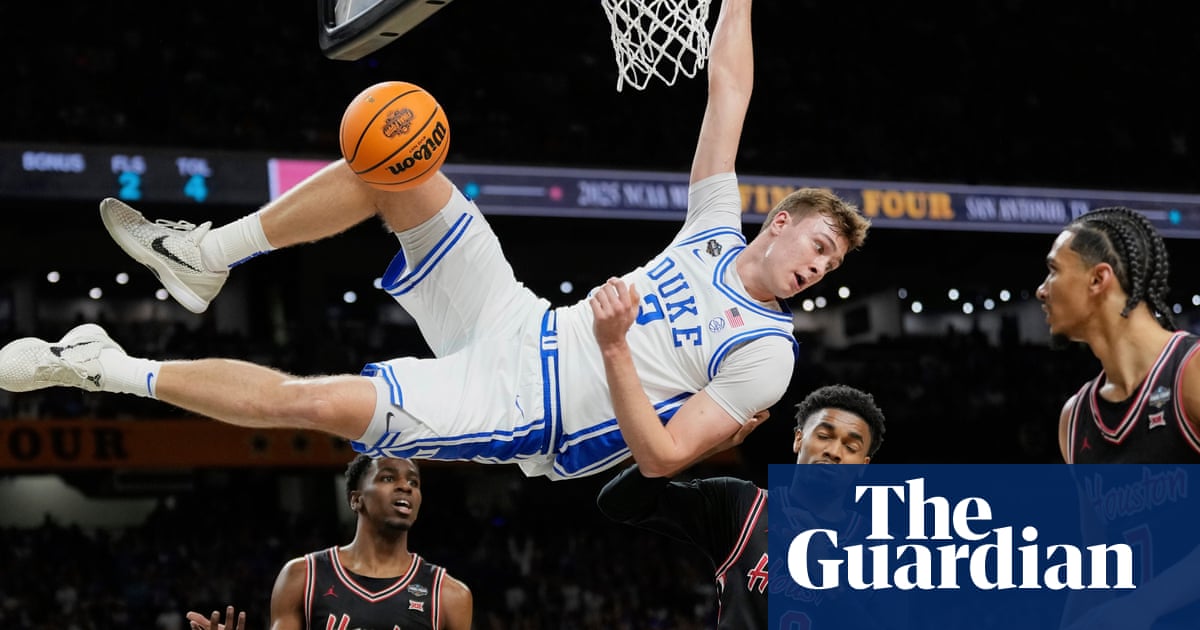Dallas is ground zero for one of America’s most historic conspiracy theories. Just half a mile from the grassy knoll where John F Kennedy was assassinated on 22 November 1963, sits the American Airlines Center – the newest site of Dallas conspiracy lore.
While this year’s NBA draft lottery took place in Chicago on Monday night, the heart of the drama haunts Dallas. Mavericks general manager Nico Harrison’s career lives to see another day after his team improbably beat 1.8% oddsto land the No 1 pick in this year’s draft– which they will almost certainly use to pick Duke phenom Cooper Flagg, one ofthe most talented college players in years. The 6ft 9in wing will presumably usher in the first full season of Dallas’s post-Luka Dončić era. Mavs fans almost have to laugh, or maybe raise a very suspicious eyebrow. With the NBA’s four worst teams (Washington Wizards, Charlotte Hornets, Utah Jazz, and New Orleans Pelicans) all taking a nosedive in the lottery, the storyline is tailor-made for a grand conspiracy theory.
The Mavs’ decision in February to trade away Dončić garneredwidespread conjecturearound the franchise’s owners, the Adelson family, tanking the team to eventually move them to their home base of Las Vegas, where they could add an NBA team to their casino empire. There were also theories aroundthe NBA’s disappointing ratingsand what a prodigy like Dončić could do in Los Angeles. Those theories were only amplified by thepoor return the Mavericks got in return for Dončić, already widely considered a future Hall of Famer.Online speculation quickly connectedHarrison, NBA commissioner Adam Silver and Lakers GM Rob Pelinka in a shadowy quid pro quo: send Dončić to one of the NBA marquee franchises, the Lakers, where he would play alongside the league’s biggest name, LeBron James, and Harrison would be rewarded with the No 1 pick. It’s a tale fit for any great sports conspiracy.
In the real world, Mavs fans have had a hell of a year. They watched their team, which had reached the NBA finals less than a year before, blown apart by their general manager as Dončić, a beloved superstar who had no desire to leave the city, was shown the door. And on the way out,Harrison and the organization disparagedDončić’s name, weight, commitment and tenure at every turn. Injuries broke apart any hope the fanbase had of reclamation this season, which ended with a disappointing play-in tournament exit. Now, they have a chance at a silver lining, and more importantly, a new chapter in the dismal story Harrison had started to write for the franchise.
There’s a chance the Mavericks could trade the pick, perhaps as the centerpiece in a deal for two-time MVP Giannis Antetokounmpo,who is reportedly opento leaving the Milwaukee Bucks. But Dallas fans need the healing only a homegrown star can provide. Drafting Flagg would give Mavericks fans someone with them from the beginning of his career to rally behind, with the same kind of seismic potential Dončić once brought. Trading the pick for another star, in yet another attempt to manufacture a contender through trades, wouldn’t mend the wound left by Harrison’s unraveling of the Dirk Nowitzki-to-Dončić handoff – one that symbolized more than two decades of Mavs continuity. Flagg offers a clean slate, one that finally anchors the present and future after Harrison mortgaged most of the team’s draft capital in the Dončić era.
Mavs fans never deserved Harrison’s mismanagement. The lottery win was a near-impossible stroke of luck. Before Monday night, Mavericks fans braced for a bleak future. Anthony Davis, the return centerpiece for Dončić, has struggled with injuries since arriving. Kyrie Irving is expected to miss the first half of next season recovering from an ACL tear at age 33.
Harrison has been public enemy number one since trading Dončić to the rival Lakers in February. Chants calling for his firing have erupted across Dallas, from college basketball games and concerts toMedieval Times. He avoided his usual seat at the Mavs’ arena. He delayed holding a press conference until forced by Mavericks governor Patrick Dumont. The coffee shop whereHarrison and Pelinka first discusseda Dončić trade has marked the infamous table with“Luka was traded here”on a laminated strip. But on lottery night,Harrison was seen leaping with joywhen Dallas secured the first pick. Rumors were already swirling that Dumont wanted tobring in a seasoned executiveto assist him on basketball decisions. It’s safe to say winning the lottery has saved his job although the blame doesn’t stop with him. He was hired by Mark Cuban,retained by Miriam Adelson, and empowered by Dumont.
Now Harrison and the Mavs have an unexpected chance to rebuild trust with their fans. The Mavericks have historically built through the draft, from Mark Aguirre and Rolando Blackman in 1981 to Jason Kidd, Dirk Nowitzki, Jalen Brunson, and Dončić. Harrison may be too steeped in his own arrogance to see that. His many tone-deaf comments on the Dončić trade revealed a staggering lack of understanding of the fanbase that pays his checks.
Winning the draft lottery at such odds takes either a miracle or a grand conspiracy. Knowing what to do with the gift you’ve been given should be a no-brainer. We have a little over a month to find out what kind of leader Harrison chooses to be.
